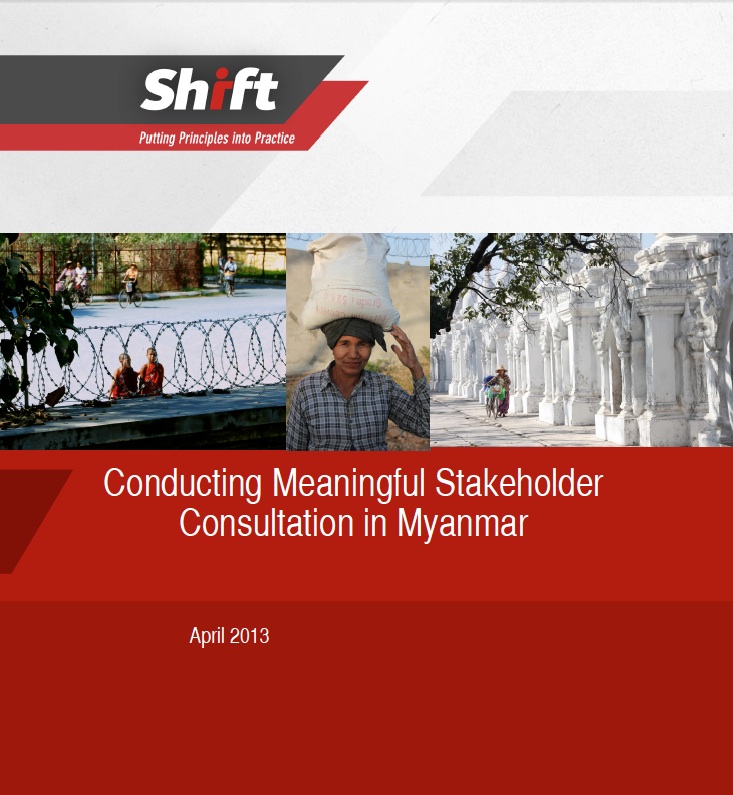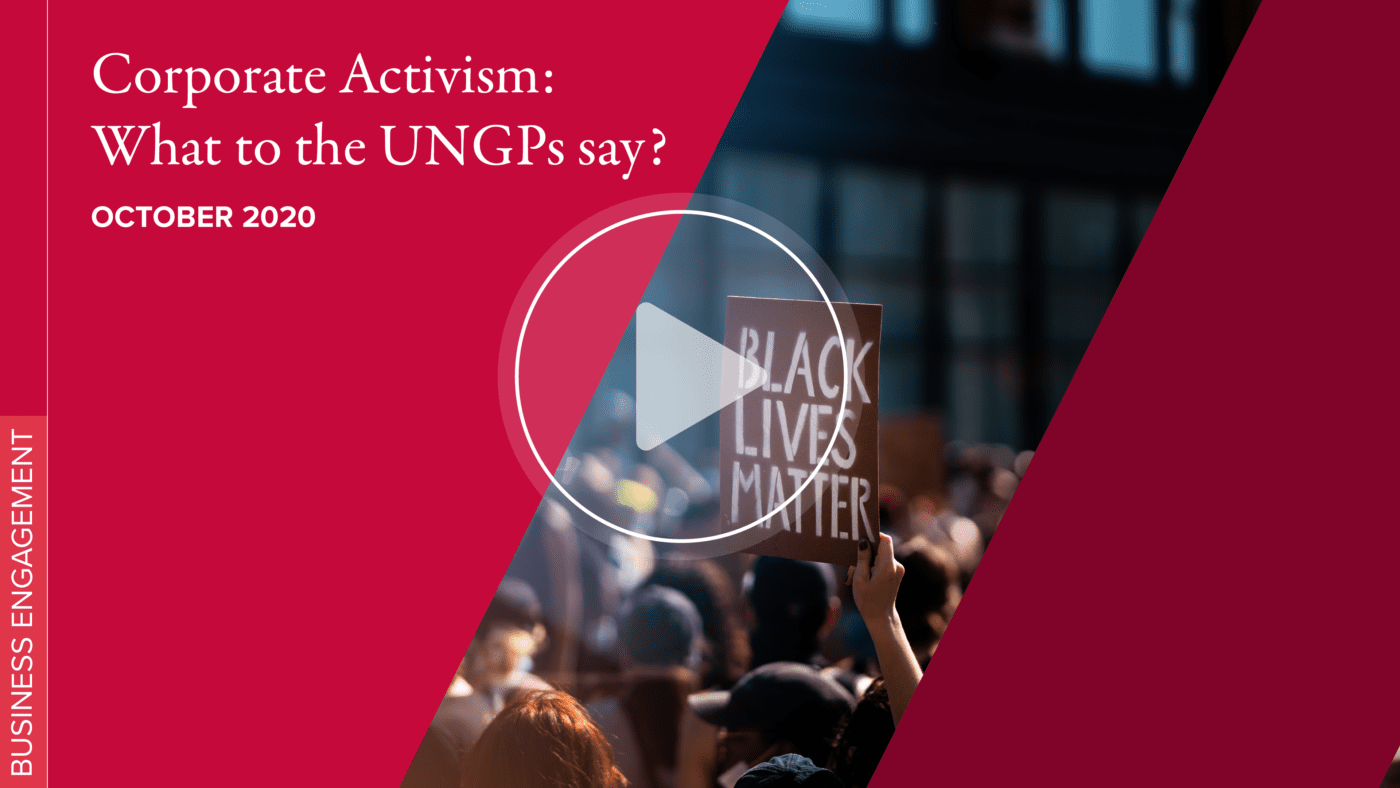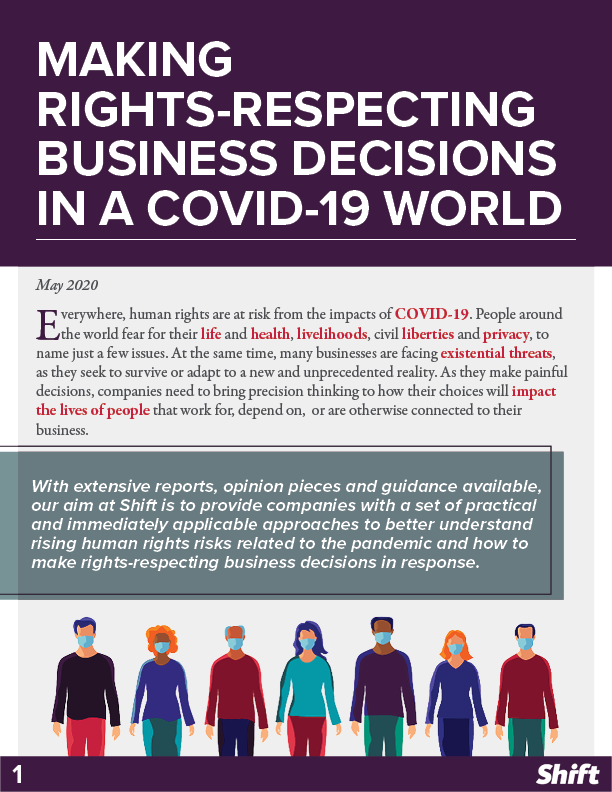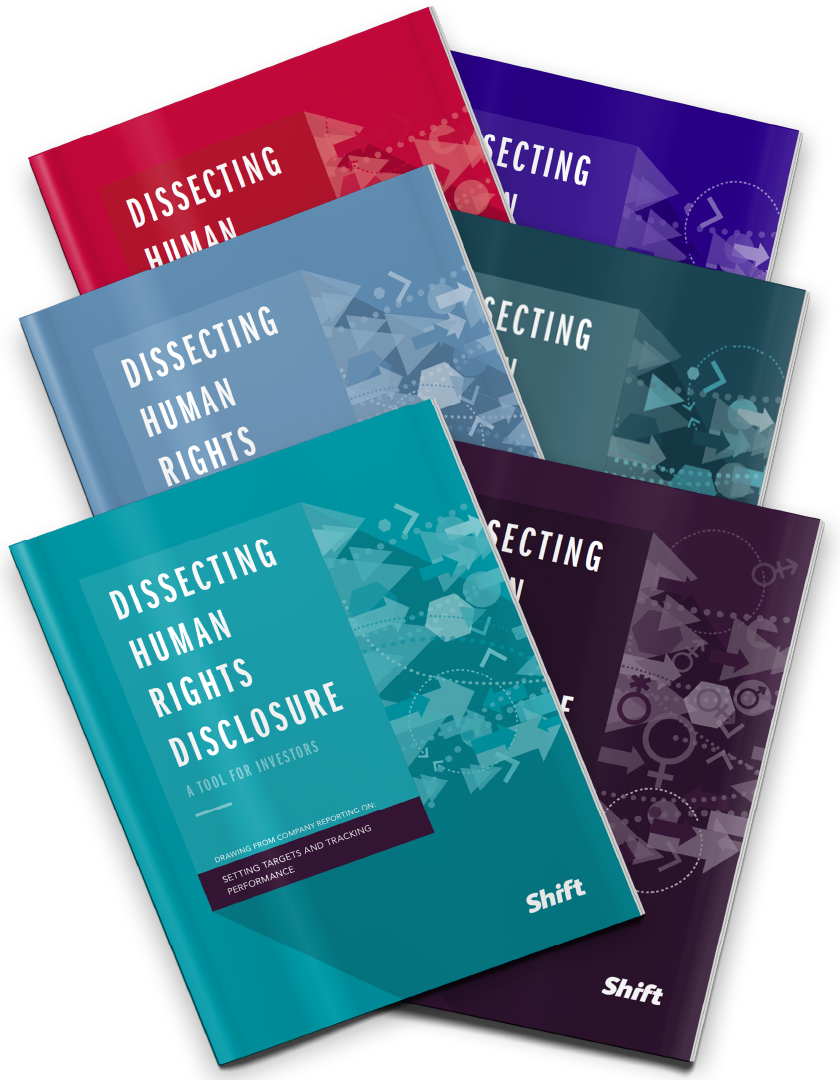The research for this report was funded by the Government of Sweden. | Also see our Viewpoint on this topic
Summary
A large number of western companies from a wide range of sectors are now seeking to operate in Myanmar and can bring a number of substantial benefits to Burmese citizens. At the same time, Myanmar is only recently emerging from years of military rule that were characterized by extensive human rights violations, weak rule of law, corruption, and decades of civil war in Myanmar’s ethnic states. In this context, companies face significant risks of causing, contributing to, or being linked to negative human rights impacts in Myanmar. The UN Guiding Principles on Business and Human Rights, endorsed by the UN Human Rights Council in June 2011, provide guidance on how meaningful consultation with potentially affected groups and other relevant stakeholders can assist companies, both to gauge and mitigate their risk of involvement with human rights impacts.
Shift compiled this report to assist companies that are considering operating, or are already operating, in Myanmar as they structure their stakeholder engagement process. Shift conducted community consultations and interviews with representatives of non-governmental organizations, networks of organizations, think tanks, and other civil society organizations, as well as entrepreneurs, Embassies and development agencies in Myanmar and on the Myanmar/Thai border. The questions asked were designed to (1) enable a survey of stakeholder viewpoints relating to the entry of companies into Myanmar, and (2) elaborate on the elements for companies to consider when structuring a stakeholder engagement strategy. A number of recurring themes emerged from the answers provided.
High Expectations: Interviewees have high expectations of the benefits that companies can bring to Myanmar. Not only do they look to companies to create jobs and decrease the level of poverty, they also hope that companies can assist in ensuring that Myanmar’s recent economic and political reforms pave the way for a peaceful future, founded on respect for human rights and fundamental freedoms, by all and for all. Interviewees further observed that the entry of new companies can be an opportunity to set higher standards for corporate conduct than those imposed under current laws, which were deemed to be inadequate, weak and poorly-enforced.
Significant Fear: Interviewees expressed significant fear of being taken advantage of as the country opens up to the outside world. Interviewees remarked that they have yet to see benefits resulting from the presence of companies. Moving forward, they would like to see companies establish a ‘win-win’ situation, where corporate operations benefit both the companies and the people of Myanmar generally, rather than a select few within the country. Interviewees further feared that companies would structure their operations in Myanmar without an accurate understanding of the situation on the ground. They emphasized how fragile and complex the recent economic and political reforms are.
Interviewees noted with concern the increase in land grabbing. In particular, the mere anticipation of business is leading unscrupulous powerful individuals as well as crony-led companies to grab land, which they plan in turn to sell to companies at a profit in the future. They feared that companies would perpetuate low labor standards and contribute to environmental degradation. Interviewees also requested that companies make an extra effort to prevent violent crackdowns against protestors, and urged companies to recall that freedom of expression and peaceful assembly is very new in Myanmar and that its limits are currently being tested by local communities. Interviewees expressed concern that new companies may wipe out their small farming businesses or favor one group of Burmese over others. A large number of interviewees remarked that companies will have to hold themselves to a higher standard than the current laws and regulations.
Regional Differences: Interviewees from ethnic states remarked that companies are not welcome in the ethnic states until the ceasefire agreements are stable, peace agreements have been concluded and political dialogue has been achieved. The interviewees noted that the stakes are high in the current context. They fear that companies will upset the ongoing democratic reform process that is still seen as extremely fragile. Interviewees further noted that change has yet to trickle through outside of the larger cities of Yangon, Naypyidaw and Mandalay.
Shifting Civil Society Scene: Interviewees emphasized that stakeholder consultation in a country emerging from decades of military rule is necessarily complex. They underlined that the long history of opposition to the military regime makes the situation especially polarizing and that the role of civil society, including community-based organizations and non-governmental organizations, was shifting considerably.
Determining Stakeholders to Engage With: Interviewees highlighted a large number of organizations that could assist companies in understanding the specific context in their area of operation, identifying who to speak with, and providing guidance on how to tailor stakeholder engagement so that it is meaningful in that area. The stakeholders identified included the government and the political opposition, international actors, local networks and sector-specific organizations working, for instance, on land, labor, the environment, gender, and special economic zones. Interviewees highlighted the added complexity of meaningful consultation in ethnic states characterized by years of armed conflict, poor living conditions, and negative experience with corporate engagement. They identified a number of community-based organizations, issues-specific civil society organizations, and youth and student organizations that can assist companies in structuring their stakeholder engagement in these ethnic states, once political dialogue has been achieved.
Expectations of Meaningful Consultation: Interviewees expected companies to proceed with genuine, meaningful consultation and provided suggestions for how companies can conduct grassroots stakeholder consultation which involves: (1) transparency and understanding in a public education phase, (2) inclusion in a public dialogue phase, and (3) integration of community concerns in a feedback phase. They saw these phases as key for companies to provide a “win-win” situation that benefits both the companies and the Burmese people at large.




